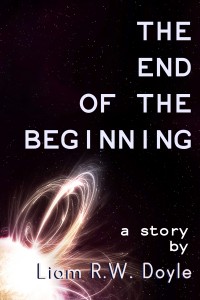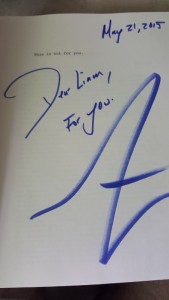 It can be difficult trying to decide what swords are worth falling on, what one’s ethics require of them in regards to the small things. Deciding one small thing might mean more than it seems, or that the small things add up.
It can be difficult trying to decide what swords are worth falling on, what one’s ethics require of them in regards to the small things. Deciding one small thing might mean more than it seems, or that the small things add up.
I’ve been thinking about the film “Ready Player One” for a few weeks now, trying to decide if I’m going to see it or not. There’s an interesting article, “The Complexities of Supporting Art by Problematic Artists,” where the author discusses how and if we can, personally, support the work and art of people who have been uncovered to be terrible people. (Quick side note, my problems with Ready Player One are entirely with the writing and the content, and absolutely nothing to do with the author, Earnest Cline. I have met him, and have a couple degrees of separation from him by friends, and I’ve found him to be a spectacularly friendly and gregarious fellow, with no hint or allegation of himself being “a problem.” The above article, however, is a good essay on dealing with accepting problem-connected art.)
The author of the essay, in light of all the allegations coming out about terrible men in Hollywood, says:
Does this mean you should boycott all music created by these artists because you don’t agree with their personal lives?
I can’t answer that because that’s for you to decide.
Personally, I know I won’t be able to veto everything that’s problematic or created by problematic individuals… nor can I as a woman of colour. If I did, there would literally be a handful of music, shows, and movies I could consume without getting upset… which is both disappointing but true.
It’s true that many terrible people have been involved in some of the greatest or most popular works of art we know. We have to decide whether the work itself can stand alone from the creator. To this, she continues:
You have a bigger voice in society than you think and it’s your duty to be a vigilant consumer. Are you contributing to a society that values the output of art over moral integrity? Does this even matter to you?
Personally, I don’t believe art can be completely isolated and removed from the artist. Art embodies cultural footprints and implicit connotations that can either enrich or diminish its value. What might just be art to one person is a can of worms to another. Just because you can separate a piece of art from the artist doesn’t mean everybody else can.
And it’s with this in mind I’m having to make decisions about “Ready Player One.”
But why this film, this book? Why is this a problem, and I’ve not angst and blogged about anything else, like, maybe the latest Harry Potter-verse film with Johnny Depp?
This is problematic for me, and I feel my actions say something more significant in regards to what I do about this film, specifically because I am precisely its target audience. The film, well, most certainly the book, was written by and for white, middle-class, “x-gen” males. Almost to the exclusion of anyone else. The book was written for me, the film made for me. If I patronize it or not, I’m saying something about whether or not I accept and validate the problems inherent, or I refuse them.
What are the problems, precisely?
Well, let’s get the easiest one to deal with out of the way right off — it’s a poorly written novel. It’s a Mary Sue wish-fulfillment tale with no real peril or depth, no character arc of development, and as this article, puts it: “Ready Player One Is an Orgy of Nostalgia in All the Wrong Ways.” Or as one commentor online, who I can’t find to give credit to the quote, said: “*Ready Player One* is *Shrek* for nerds – a simple-ass story built out of soulless references to other pop cultural artifacts, constructed entirely to stimulate the pleasure of recognition.” At no point in the novel did I feel the hero was in any danger. In fact, pretty much a quarter of the way in I pretty much knew exactly how it was going to end, with, spoiler, him getting everything he wants, including the trophy girl. (More on the real problem of that in a second.)
Earnest Cline also wrote the 2009 film “Fanboys,” which has many of the same problems. Primarily, for me, was the climax of the film (as well as a demi-climax halfway through), was entirely a trivia contest. The protagonists had to prove they’re worthy by answering trivia questions, see how much esoterica they knew about Star Wars. That’s the “final battle” of the film. And Ready Player One is essentially that “soulless stimulation of pleasure of recognition” for an entire novel.
The problems I found with the writing are well-stated in the critique, “Why So Much Backlash? Ready Player One is Basically Twilight for Nerds” which I found myself nodding the entire way through:
The relentless references soon started wearing thin, and Wade’s ability to effortlessly conquer his challenges—like playing a perfect game of Pac-Man—started feeling empty and undeserved. By the time one of Wade’s obstacles for saving the world entails him and his friends reciting dialogue from Monty Python and the Holy Grail (a feat they accomplish with glee), I felt like a kid who thinks eating an entire cake by himself sounded fun—I was sick of it, and craving something of real substance. But the thing is, Cline really loves the ‘80s and expects the reader to feel the same. If he’s right to think that this affection is enough to carry the reader along on its own, then his deluge of pop culture references makes sense. If he’s wrong, the reader is left with references they either don’t know or don’t care about, an onslaught of nerdy nostalgia that often doesn’t advance the plot, and very simplistic writing. As in, even more basic than Twilight’s writing. In fact, film analyst Lindsay Ellis recently released a video apologizing to Meyer for getting caught up in the frenzy of bashing Twilight years ago, and acknowledging now that Meyer’s writing is really not as atrocious as everyone makes it out to be. A book Ellis mentions as having legitimately terrible writing, on the other hand? Ready Player One.
That said, I won’t not see a film because of that! One bit. I have a very low bar for quality when it comes to movies, so long as it’s audio-visually appealing. And, “Ready Player One” does promise to be that!
No, the real problems with the novel (and most likely the film), come from the toxic masculinity, the tokenism, casual racism, and misogynistic sexism deeply embedded in it.
Remember that trophy girlfriend mentioned? That’s essentially the only purpose the female character serves in the novel is to be something to be won by the hero. And to push the hero to winning his destined reward, herself getting nothing except, presumably, the pleasure of being his to own as well. On top of that, the novel falls deeply into the now-toxic trope considered a standard of so many “rom-coms,” of the guy not taking “no” for an answer. He continues to barrage and harangue her, stalking and badgering her, until she’s finally worn down and gives in — and this is considered “romantic”! Huge problem with that.
The article “The Trophy Woman of Ready Player One” does a good job focusing on that problem of the novel/film.
Then we have the tokenism and racism, addressed in this article, “We Need to Talk About Representation in ‘Ready Player One’.” This article does a far better job than I can at addressing the racism, and abelism, I felt reading it. More than implying that is you’re black, gay, disabled, disfigured, female, you better hide it… the crass patronizing only we privileged can commit by, “looking past those flaws, anyway.”
But finally, here is where it comes down to for me, where my patronage, my support or rejection, speaks directly to my experience: Ready Player One reinforces the misogynistic penis-measuring gatekeeping found rife throughout nerd culture.
I’m a nerd, been one all my life. Playing D&D since I was 10, read The Silmarillion at 12, spent every lunchtime in the school library writing programs in Apple Basic at 14, etc etc and all the stereotypes of being a geek and nerd since. And one thing nerds of all stripes do, is challenge each other to prove out worth in how much we know about something. Usually, among what has traditionally been a male-dominated culture, a newcomer says “I’m into X too!” and we fellow nerds might ask, “What’s your favorite Y from it?” and with even a vaguely acceptable answer, they’re in the club.
But to mansplain to people who are not female-identified for a second, this is not what happens to girls and women in nerd culture. If you’re female, and you dare to try to intrude into the community and say, “I like X, too,” you will be barraged with an endless challenge of questions going deeper and more minute than anything a guy would have to deal with, to prove yourself. And often times, the goalposts are moved to much and so often, there’s simply no winning, no acceptance. This kind of gatekeeping is used in such a vitriolic and cruel manner to “keep girls out!” I’ve seen it done, any woman vaguely interested in anything nerdy will likely tell you stories of it being done to her, and I thank my effing stars I never participated in it myself before I became aware of it.
Ready Player One is this gatekeeping, which the entire climax of “Fanboys” consists of, is a celebration of this, at best, pissing contest, at worst, weapon against interloping women upon the guy’s domain, purified and concentrated into the very core of what the story is.
Ultimately, I really can’t support this film, even if it improves upon the novel (which I seriously doubt it can), because of the very problems inherent in the story itself. As well as supporting the film is support of the source novel that spawned it. This is a film that if it came out some years ago, I would have raced to see, and probably see over and again as my dopamine receptors flooded with “the pleasure of (self-congratulatory) recognition” with each re-watch revealing new things I could elbow my friends with, “Didjya catch that?? Did you know what that was? Are you as knowledgeable as me??” But we don’t live in a world where we, and I’m no longer a guy who, can accept such thoughtlessly insensitive and even outright offensive representation simply for entertainment value.
Related Posts:




 It can be difficult trying to decide what swords are worth falling on, what one’s ethics require of them in regards to the small things. Deciding one small thing might mean more than it seems, or that the small things add up.
It can be difficult trying to decide what swords are worth falling on, what one’s ethics require of them in regards to the small things. Deciding one small thing might mean more than it seems, or that the small things add up.

 Singularity Deferred:
Singularity Deferred: 




